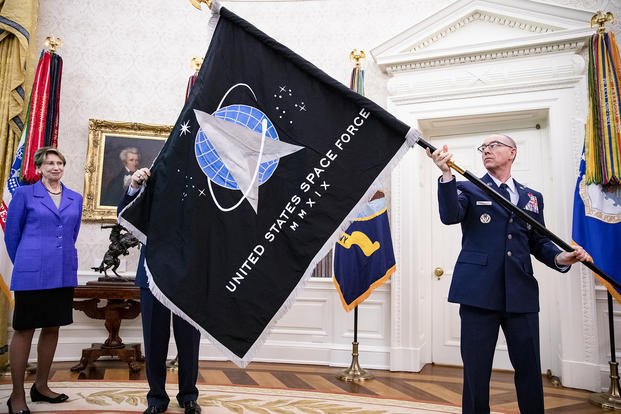
DENVER — An intense persuasion campaign is heating up across more than 1,200 miles, from Colorado Springs to Alabama, as both states’ congressional delegations battle over landing the permanent headquarters of the U.S. Space Command.
Colorado’s elected officials want to keep the command at Peterson Space Force Base, where it has been based since the service was revived in the summer of 2019 under then-President Donald Trump. Meanwhile, Alabama’s delegation to Congress is gunning to get the command headquarters to Redstone Arsenal in Huntsville, where Trump had moved it in the waning days of his first term in the White House.
That order was overturned by President Joe Biden — a decision that kept the service in Colorado Springs, where the Denver Metro Chamber of Commerce estimates it supports nearly 1,400 jobs and has a $1 billion impact on the local economy.
“It’s a fully operational and capable command,” U.S. Rep. Jason Crow said in an interview with The Denver Post. “It continues to build out and perform the mission it is supposed to. We simply can’t move it — we will jeopardize our national security if we do.”
But in a preview of what could be a tough scrap ahead, Republican U.S. Sen. Tommy Tuberville of Alabama this week told a local TV station that he was confident President-elect Trump “will move it back, and I think, very early in his first few days.”
That claim was echoed by U.S. Rep. Mike Rogers, R-Ala., who told a Mobile radio station that he thought the soon-to-be president would sign an executive order bringing the command back to Huntsville.
Crow, a Democrat and a former Army Ranger, said he has been in contact with the seven other members of the state’s congressional delegation — in addition to Sens. John Hickenlooper and Michael Bennet — and they plan to “work hand in glove together” to keep the U.S. Space Command in Colorado.
The command is responsible for military operations in outer space, which starts at 62 miles above sea level. The Pentagon is growing increasingly concerned about rapid advances by China and Russia in space-based operations that threaten U.S. troops and other military assets on the ground, along with American satellites in orbit, the New York Times reported earlier this year.
On Friday, Schriever Space Force Base in Colorado Springs was named the “preferred and final” home of Space Delta 15, an organization under U.S. Space Command that will provide space battle management, intelligence and cyber capabilities to U.S. Space Forces. Air Force officials said Delta 15 would be operational by summer of 2027, with approximately 250 personnel on hand.
Newly elected U.S. Rep. Gabe Evans told reporters at a press conference last week that he was on “Team Colorado” when it comes to Space Command staying put. The Republican Army vet and former police officer, who ousted Yadira Caraveo on Nov. 5 in the 8th Congressional District, said moving would cost an exorbitant sum of money.
“Why do you want to spend money to move it out of here?” he asked.
Evans said his grandfather, a naval aviator, moved to Colorado to work in the state’s robust aerospace industry 50 years ago.
“That’s why I live in Colorado — because of our aerospace sector,” he said.
Evans is part of the GOP half of Colorado’s congressional delegation that could have more influence with Trump as he nears a decision on the command. All four are in lockstep on keeping the service in Colorado.
U.S. Rep.-elect Jeff Crank, whose new district is the home of the command, wasn’t available for an interview this week. But he told The Post this month that “it makes eminent sense to keep it here.” U.S. Rep.-elect Jeff Hurd, who will represent the Western Slope in the new Congress, said the same through a spokesman Thursday.
U.S. Rep. Lauren Boebert, a stalwart Trump supporter who is returning to Congress in January to represent Colorado’s 4th District, said “protecting and maintaining all of our military assets in Colorado is the best way to keep our nation strong without any threat of interruption that could harm our ability to protect Americans.”
Huntsville scored higher than Colorado Springs in a Government Accountability Office assessment of potential locations for the command. The city has long been home to some of the earliest missiles used in the nation’s space programs, including the Saturn V rocket, and it is home to the Army’s Space and Missile Defense Command.
That same office, however, gave the selection process low marks for documentation, credibility and impartiality and said that senior U.S. officials interviewed conveyed that remaining in Colorado Springs “would allow U.S. Space Command to reach full operational capability as quickly as possible.”
Trump’s decision to move the U.S. Space Command to Huntsville in January 2021 was widely panned as a political attempt to reward Tuberville, who challenged the results of the 2020 presidential election in favor of Trump.
Bruce McClintock, lead of the Space Enterprise Initiative at the nonpartisan research firm Rand Corporation and a retired Air Force brigadier general, did not weigh in on whether Alabama or Colorado would ultimately be a better fit for Space Command, but said that any move could lead to disruptions in military readiness.
“Moving any combatant command headquarters invariably introduces turbulence in the workforce,” McClintock said in an email. “The military workforce will go where they are directed but the civilian workforce can choose to stay where they are rather than move.”
If China’s space ambitions are truly a threat to American interests, he wrote, “then one could make the argument that the near-term stability for US SPACECOM should be a factor in the government decision-making process.”
© 2024 MediaNews Group Inc.
Visit at denverpost.com.
Distributed by Tribune Content Agency, LLC.
© Copyright 2024 The Denver Post. All rights reserved. This material may not be published, broadcast, rewritten or redistributed.






